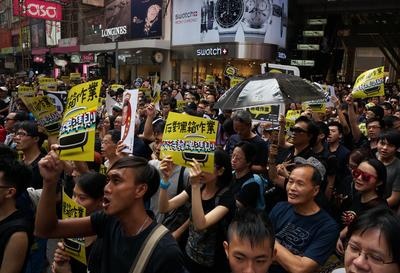The failure to disclose the reasons for its decision also revealed the government’s lack of transparency in the decision-making process.
The general public believe that program quality is deteriorating due to the lack of competition between the two existing free-to-air television stations, Television Broadcasts Limited and AsiaTV. This is especially so because AsiaTV is often at the point of bankruptcy — it filed for bankruptcy in 2011 and has repeatedly reported financial difficulties. Naturally, the public hoped that an increase in competition through new licences would increase the quality of television programs and provide the community with more options. Television remains the most important source of entertainment for ordinary people in Hong Kong.
The people of Hong Kong were surprised by the news of the denial of a licence to HKTV, which had been the most aggressive in its preparations leading up to the decision. Many have claimed that the government’s decision was based on its intention to save AsiaTV because it was not expected to survive in a more competitive market. AsiaTV has certainly been the most pro-Beijing and its owners have excellent connections in Beijing.
HKTV, on the other hand, is perceived to be politically unreliable. Its founder and chairman, Ricky Wong Wai-kay, does not have any substantial investments in China, where as the two new networks that were granted licences, PCCW and i-Cable, do. PCCW and i-Cable are also major business players in the territory.
The public believe that the CY Leung administration was too eager to please the Chinese authorities at the expense of the ordinary people’s interests. The decision also violated the basic principle at the very foundation of the territory’s economic success: fair competition.
Around 120,000 people took part in a protest rally organised by the HKTV staff who had lost their jobs following the government’s decision. Facing the public’s outrage, several members of the Executive Council (the cabinet of the Chief Executive) attempted to distance themselves from the Chief Executive, implying that he alone was responsible for the decision. This discredited Leung as he was seen to be losing control of his own team — as well as the Executive Council itself, which is supposed to be founded on the principle of collective responsibility.
The protesters then turned their attention to the Legislative Council, demanding — unsuccessfully — the documents related to the decision be publicly released. While a clear majority of the people would have demanded the legislators to support the motion, the functional-constituency legislators largely ignored the community’s appeal. Worse still, Beijing’s organ in Hong Kong, the Central Liaison Office, had been actively engaged in lobbying the pro-establishment legislators.
The Legislative Council’s decision also exposes the inadequacy of democracy in the electoral system, as only 40 of the 70 legislators are returned by universal suffrage. Those from very narrowly based functional constituencies are easily influenced by the lobbying of Beijing, which has been less and less restrained from interventions in Hong Kong.
The HKTV controversy reveals the people’s strong dissatisfaction with the CY Leung administration, which is leading the territory toward a potential crisis. The Chinese authorities have also informed the public that they had not taken a position on the issue, implying that Leung has to assume responsibility himself.
The most important lesson to take away from this is that without democracy, people’s basic interests and core values might be threatened. These sentiments may well enhance the support for democratisation in the present political reform struggles.
Joseph Cheng is Professor of Political Science at the City University of Hong Kong.

